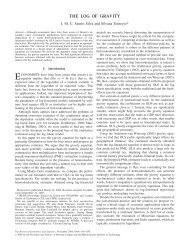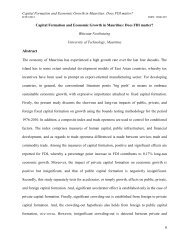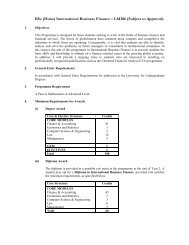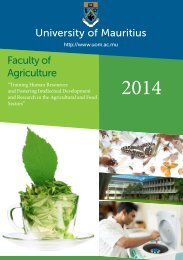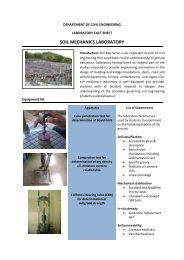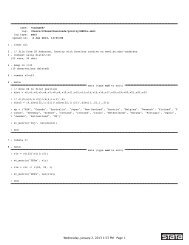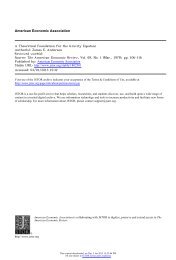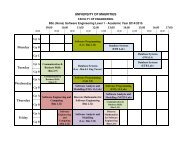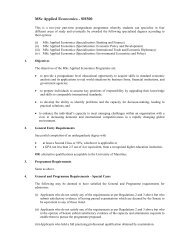SACU Revenue Sharing Formula - the University of Mauritius
SACU Revenue Sharing Formula - the University of Mauritius
SACU Revenue Sharing Formula - the University of Mauritius
Create successful ePaper yourself
Turn your PDF publications into a flip-book with our unique Google optimized e-Paper software.
ICITI 2012 ISSN: 169412252. The transfer payments to <strong>the</strong> net losers must be sufficient to compensate <strong>the</strong>m for<strong>the</strong> negative externalities incurred 35 .3. The payments made by <strong>the</strong> net gainers from <strong>the</strong> customs union to net losers mustbe less than <strong>the</strong> external benefits <strong>the</strong> gainers derive from <strong>the</strong> arrangement.Whe<strong>the</strong>r <strong>the</strong>se three conditions have been met throughout <strong>the</strong> life <strong>of</strong> <strong>SACU</strong> is debatableas <strong>the</strong> BLS/BLNS have always argued that <strong>the</strong> compensation that <strong>the</strong>y have received never reallyaddress <strong>the</strong> losses stemming from polarization or cost raising effects. However with <strong>the</strong> advent<strong>of</strong> Sou<strong>the</strong>rn African Development Community (SADC) Protocol on Trade over <strong>the</strong> 2000-2008period <strong>the</strong> third stability condition and arguably <strong>the</strong> first has been violated. The SADCagreement creates roughly equal market access for South Africa‟s exports into all SADC marketswhich includes all <strong>the</strong> BLNS and does not involve <strong>the</strong> level <strong>of</strong> consultation and co-ordination <strong>of</strong>a customs union. Thus <strong>the</strong> externalities derived from economies <strong>of</strong> scale derived by South Africacould be derived without any need for transfer payments to <strong>the</strong> BLNS as such payments are notpart <strong>of</strong> <strong>the</strong> SADC Protocol on Trade. By agreeing to SADC <strong>the</strong> BLNS created in effect aninstrument which completely undermined <strong>the</strong> principle justification for <strong>the</strong> <strong>SACU</strong> transfers.However, <strong>the</strong> problem is that <strong>the</strong> stability <strong>of</strong> <strong>the</strong> SADC Protocol on Trade itself cannot beassured without <strong>SACU</strong> transfers to <strong>the</strong> BLNS because <strong>the</strong> latter would have to breach <strong>the</strong>ircommitments to not impose tariffs on imports from o<strong>the</strong>r SADC members without <strong>the</strong>serevenues. The trade <strong>of</strong>f for South Africa is, as it has been for a decade, <strong>the</strong> benefits <strong>of</strong> stablemarket access under <strong>SACU</strong> with transfer payments or a potentially less stable SADC Protocol <strong>of</strong>Trade and <strong>the</strong> yet-to-be negotiated trilateral FTA arrangement without transfer payments. SouthAfrica has clearly opted for <strong>the</strong> trilateral (Comesa-EAC-SADC) free trade area as a sufficientform <strong>of</strong> market access needed for it to retain its dominant position in Sou<strong>the</strong>rn and EasternAfrica. By agreeing to <strong>the</strong> SADC Protocol on Trade, <strong>the</strong> BLNS have negotiated an instrumentthat undermines <strong>the</strong> stability <strong>of</strong> <strong>the</strong>ir government revenues and has, in part; given rise in 2011 towhat are <strong>the</strong> beginnings <strong>of</strong> a revision <strong>of</strong> <strong>the</strong> RSF that will likely see a re-distribution in favour <strong>of</strong>South Africa.d) Cost Raising and Lowering Effects and PolarizationCost Lowering EffectsCorden (1967, 1972) provided a development <strong>of</strong> Viner‟s (1950) discussion <strong>of</strong> <strong>the</strong> role <strong>of</strong>economies <strong>of</strong> scale, product differentiation and oligopoly in a customs union. Corden (1972) isnot normally employed, cited or recognized by most economists who much prefer dealing withcompetitive models with linearly homogeneous production functions where are <strong>the</strong>re are noeconomies <strong>of</strong> scale. The absence <strong>of</strong> economies <strong>of</strong> scale is important to <strong>the</strong> classical vision <strong>of</strong>trade benefiting all parties. Corden (1972) argued that where <strong>the</strong>re exists economies <strong>of</strong> scale andwith a downward sloping cost curve it is common for smaller firms to vacate a particular marketwhen a customs union is created or for <strong>the</strong> single large producer or large producers to becomeeven more dominant once <strong>the</strong> customs union market is created. Corden was thus <strong>the</strong>unrecognized precursor <strong>of</strong> <strong>the</strong> work <strong>of</strong> Krugman and <strong>the</strong> New International trade <strong>the</strong>ory almosttwo decades later.The economies <strong>of</strong> scale that result from <strong>the</strong> creation <strong>of</strong> a customs union perpetuate orexacerbate production polarization <strong>of</strong> <strong>the</strong> dominant large producers. The expansion <strong>of</strong> <strong>the</strong> market12



